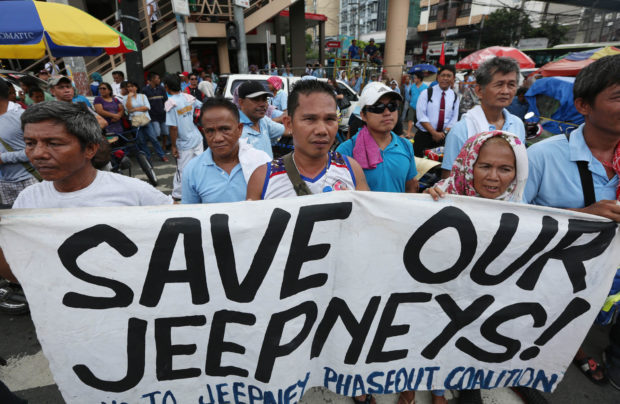Jeepney strike: Schools, gov’t offices closed

2-DAY STRIKE Jeepney drivers are starting a two-day transport strike starting today to oppose the government’s modernization plan for public utility vehicles. —MARIANNE BERMUDEZ
Suspending work and classes nationwide today, Monday, shows that Malacañang “is nervous” about the two-day transport strike protesting a program phasing out jeepneys at least 15 years old, the leader of the mass action said on Sunday.
Already, the Land Registration Franchising and Regulatory Board (LTFRB) said the mass action could be part of destabilization efforts.
“We are receiving reports that the transport strike tomorrow led by Piston (Pinagkaisang Samahan ng Tsuper and Operator Nationwide) will be supported by other left-leaning groups. Allegedly, the plot is to destabilize the government,” an LTFRB board member, Aileen Lizada, said on the eve of the strike.
Piston claims 200,000 members nationwide.
Palace, number coding
More than a week ago, President Rodrigo Duterte, facing accusations of amassing wealth he did not declare and facing mounting criticisms of his war on drugs, claimed that the Left and the political opposition had forged an alliance to oust him.
Article continues after this advertisementWork at all branches of government and classes in all school levels nationwide are suspended today due to the transport strike. The number coding in Metro Manila and trading on the Philippine Stock Exchange are also suspended.
Article continues after this advertisementPresidential spokesperson Ernesto Abella yesterday said that Malacañang was leaving it up to Congress, the Supreme Court and constitutional commissions, as well as the private sector to decide whether their employees should come to work.
Work in all courts and in the Senate was also suspended following the Palace announcement.
Message to Piston members
Piston president George San Mateo said members of the group should not be discouraged by the cancellation of work and classes as “this just shows that the government is nervous [about] the strike.”
In a message to Piston members, San Mateo said: “We should treat this as a challenge to continue with our strike on Oct. 16 and 17 … We are supported by a lot of our countrymen who understand our plight.”
The phaseout of old public utility vehicles (PUVs) is not a new program, according to Senen Manalastas, Piston-Pampanga coordinator.
“[It] was first done on old buses, then taxis and school services. [Operators] did not protest because they were not unified. We don’t want this to happen to PUJs (public utility jeepneys),” he said.
Pampanga
In Pampanga, more than 7,000 jeepney drivers plying the San Fernando-Angeles City route said they would join the transport strike.
Manalastas said jeepney federations operating outside the two major cities would also take part in the strike.
Piston leaders said the Porac-Guagua and Porac-Dinalupihan routes would be crippled by the strike, affecting commuters at Porac, Santa Rita and Floridablanca in Pampanga, and Dinalupihan in Bataan.
In Metro Cebu cities, at least 200 drivers belonging to Piston would not ply their route this morning to join a rally on Colon Street in downtown Cebu City.
But they are expected to go back to work at 1 p.m. after the rally, said Greg Perez, Piston-Cebu president.
Perez said Piston had no plans to paralyze transportation as the group only wanted to air its side against the plan to modernize PUJs in the country.
On Panay Island, at least 20 jeepneys are to join a protest caravan, which includes stopovers in transport terminals, said Edgar Salarda, Piston coordinator in Panay.
Salarda said transport groups in Panay had already held two strikes—in February and June—against the phaseout of jeepneys.
Modernization program
Piston is protesting the PUV modernization program aimed at phasing out old PUVs, including 200,000 jeepneys. The government plans to replace the jeepneys with “eco-friendly” PUVs.
The program seeks to provide safe and comfortable transportation for the public, and ensure disciplined and competent drivers.
The new PUVs will replace vehicles that have been operating for at least 15 years, according to the Department of Transportation.
Part of the program is treating jeepney drivers as employees, providing them salaries and benefits instead of the status quo in which they compete for passengers because of the boundary system.
But transport groups branded the scheme as “antipoor.”
In a radio interview, San Mateo said Piston wanted the program to be “people-centered” that would not disenfranchise up to 300,000 small operators or dictate on the transport sector.
“The program will bury the jeepney operator in debt as he’ll have to pay P800 per day for seven years [for each new jeepney] and the operator will be required to get 10 units per franchise,” he said.
The Piston head said the government’s subsidy was for the seller of the new jeepneys and not for the operators.
Manalastas of Piston Pampanga said the protest was in defense of the livelihood of drivers. He noted that the loan of P80,000 to be offered by Landbank was not enough to purchase a Euro 4 fuel-powered vehicle worth P1.6 million.
To help stranded commuters, the LTFRB is deploying up to 70 buses in seven staging areas in Metro Manila. The buses will charge P12 for air-conditioned units and P10 for ordinary ones.
In Manila, the city government readied two trucks to offer free rides to commuters, particularly women and children, elderly and people with disability. —Reports from Jerome Aning, Philip C. Tubeza, Pathricia Ann V. Roxas, Aie Balagtas See, Tonette Orejas, Nestle Semilla, Nestor P. Burgos Jr. and Dexter Cabalza